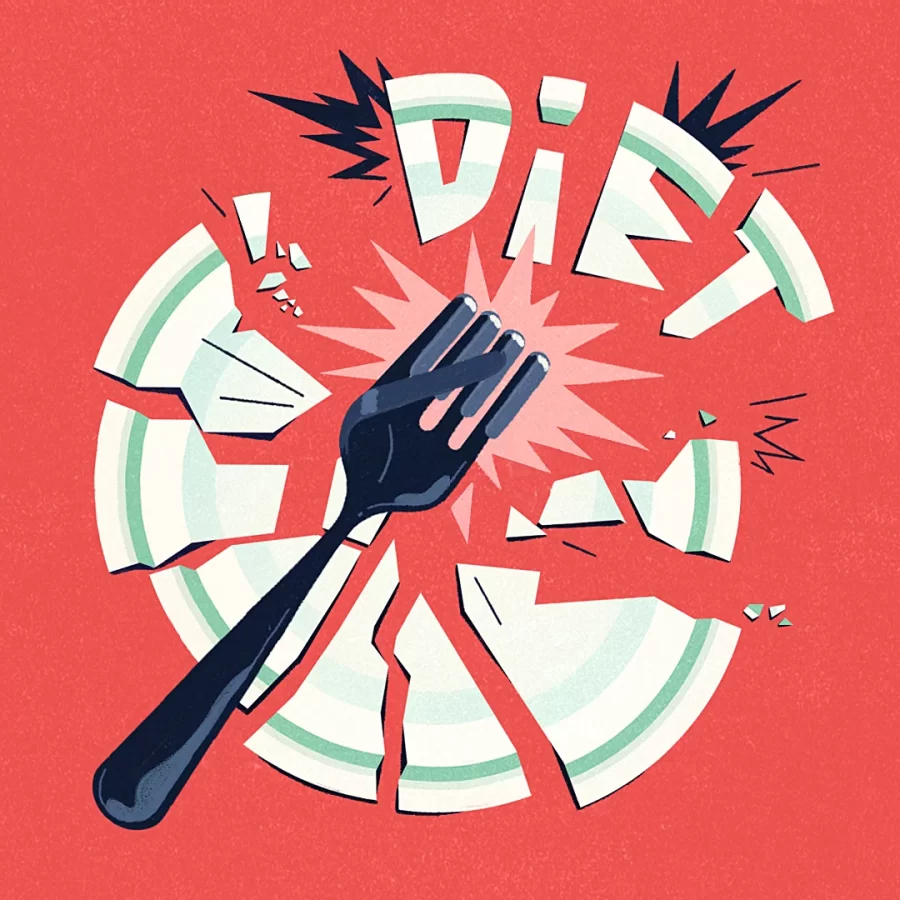The dangerous effects of diet culture throughout social media
Everyone on social media looks pretty, but this kind of influence is increasingly problematic for young people
February 18, 2022
Social media can be a great resource for communities to gather together to inspire one another, but the idea of diet culture within the media has poisoned the online environment for many.
What is diet culture and how is it represented in the media?
Diet culture is defined by body image researcher, Nadia Craddock, as “the collective set of social expectations telling us that there’s one way to be and one way to look and one way to eat and that we are a better person, we’re a more worthy person if our bodies are a certain way.” Throughout social media, there are constant reminders of harrowing beauty standards to be beautiful enough for society.
Every app has ads of calorie tracking resources and posts of required diets, categorization of “good and bad” food, workout routines and photoshopped images of unrealistic bodies. Diet culture has a wide influence; everywhere you go online, you’ll notice phrases similar to, “I fasted for two weeks and can truly see improvement on my body image.” Unfortunately there are few safe spaces in the media to escape from the toxicity of this trend.
What are the negative effects of diet culture?
To some, diet culture may not seem like such a big deal, because what’s wrong with eating healthy? There’s absolutely nothing wrong with eating healthy, but the problem with diet culture is that it considers healthy eating to be calorie counting and restriction, overworking and overexercising oneself and periods of starvation to the state of malnourishment. In reality, the healthiest form of eating is intuitive eating. Intuitive eating is the method of being mindful of what you eat, but also enjoying your favorite foods without guilt and not cutting out any food groups as a cleanse. Intuitive eating is rarely ever represented in the media, and if it is, it’s surrounded with a negative connotation.
Trending aspects of diet culture can influence children as young as five years olds who are exposed to the ideas of restrictive eating. Childhood exposure to dieting is the most leading cause of the development of eating disorders later in life. According to statistics from apa.com, due to the influence of social media’s dieting culture, eight million Americans suffer from one eating disorder or another, and about 90% of them are young girls.
Eating disorders are life threatening and have major chronic effects, such as hair loss, bone fatigue, heightened anxiety, gastrointestinal issues, low blood pressure and other health difficulties. Continuing with this culture of unhealthy dieting will only lead to the eating disorder statistics to increase even more rapidly. No one deserves to suffer in such anguish. Society needs to learn to accept everyone, despite their appearance.
We need to start remembering that all bodies are beautiful. Health looks different on everyone and a number on a scale does not determine one’s worth, nor does a measurement around your waist. At the end of the day, no one is going to remember you for the way you look, but for the lasting impacts you’ve created.
So love yourself, and allow yourself to enjoy your favorite foods without guilt. Be gentle with yourself, because no matter what you look like, or where you have been, you are so much more than enough.






